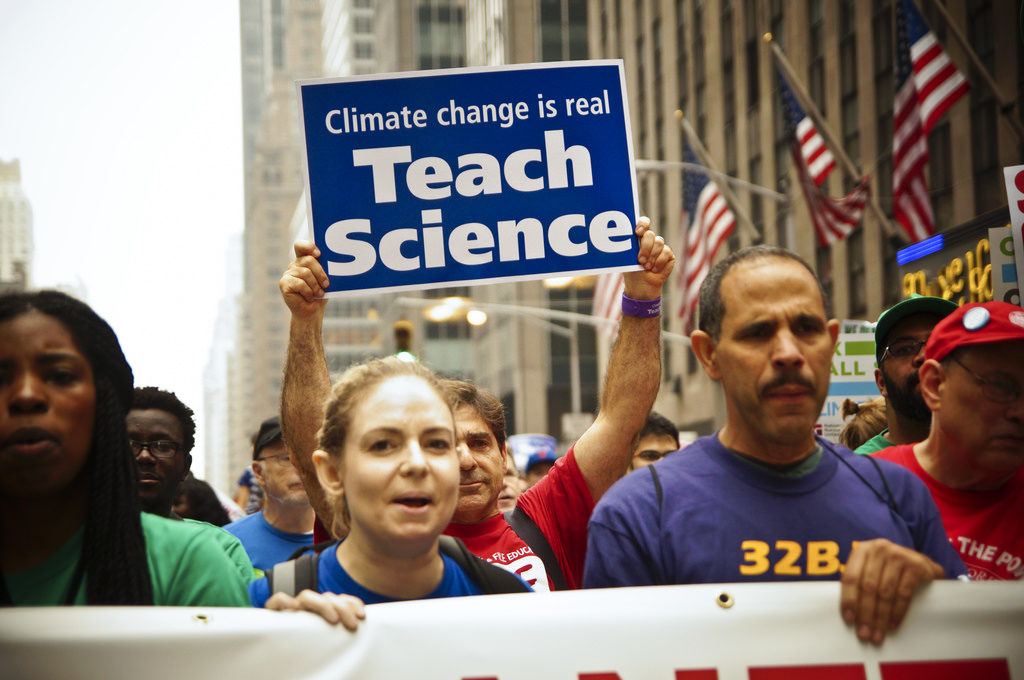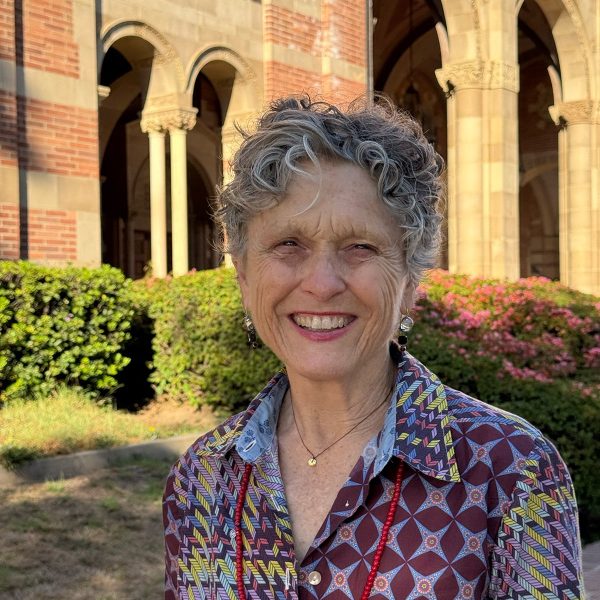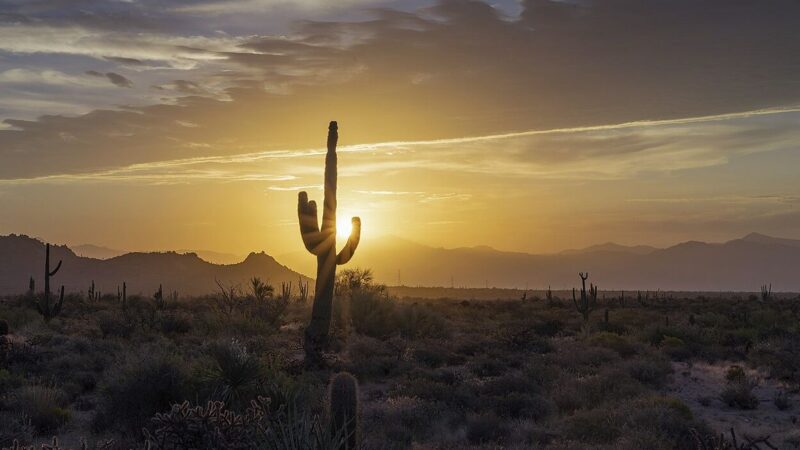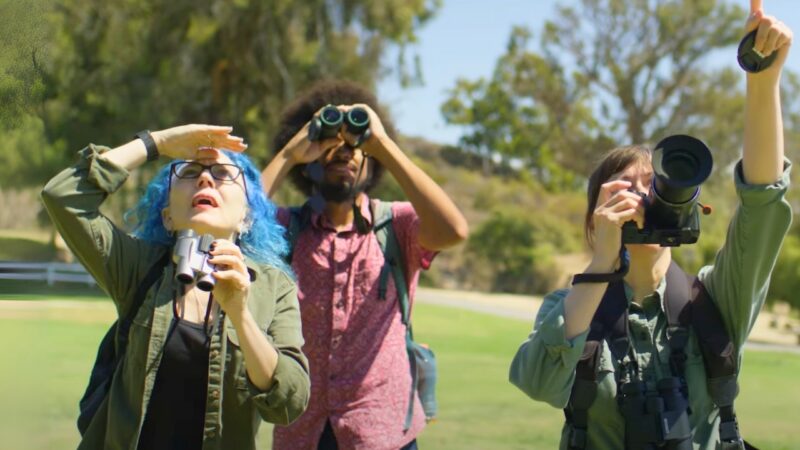
Why I march for science
Stephanie Pincetl is one of the official speakers at Saturday’s March for Science. Here’s why she’s marching.
I march for science because I am overwhelmed by the beauty and marvel of life on Earth.
I march because science is a window through which we can observe and understand the complexity and boundless diversity of life forms on the planet. I march because we need to learn to embrace the common nature of all humans, and the fact that human nature—our species—is not separate or separable from other life on the planet.
I study cities, which are the primary habitat for humanity for the first time in human history. More people now live in cities than everywhere else combined. I examine how we build these places—with what materials, and where the resources come from. I quantify who uses them to do what. This requires understanding resource flows and their impacts both on the urban inhabitants (uncovering water poverty, for example, or profligate water use) and on the far-flung places the resources and materials come from. A key aspect involves unpacking how humans organize themselves to exploit resources (e.g. engineered water systems) to support urban areas. Examining the variety of ways humans develop institutions, patterns, rules and governance structures is part of understanding human nature and how we, today, have such significant impacts on Earth systems.
One pressing mystery that needs unraveling is how we, as a species, have managed to alienate ourselves, becoming estranged from the planet we live on and depend upon. For example, over-pumping groundwater aquifers depletes them forever. It is as though we have forgotten or insulated ourselves to the obvious: we are planetary beings whose entire present and future depends on the health of our home—Earth.
So the materials we use to make cities (whether virgin timber or recycled, concrete or steel), how we live our daily lives (whether driving alone or taking transit), the amount we consume, the water we drink and the power we use are all derived from one Earth. These patterns represent a huge area of study with quantifiable impacts—not just for the sustainability of resources, but also for residents’ quality of life. And there is significant inequality in distribution of resource use, with the poorest among us consuming the least.
My center at UCLA specializes in studying electricity, natural gas, water use and urban ecosystems across southern California, excavating the relationship between buildings, their age and size, people’s wealth and consumption. Our research is foundational to conservation programs and to developing distributed solar energy generation coupled with storage to decarbonize electricity generation. We look at the artificial landscapes that have been planted over the past century, using European, tropical and other plants, the ideas of nature they represent and their water use. We use geostatistics, statistics, geographic information systems, big data and policy analysis along with urban ecology, urban history and social theory to unpack the relationships, identify drivers and most especially, ways to reduce our impacts on Earth resources while maintaining quality of life.
We are dedicated to a science that contributes to social equity and human well-being, and links human happiness to understanding we are responsible for ensuring the health of planetary systems. The complex patterns that result from evolutionary processes and are replete throughout life forms are beautiful and, in some sense, mysterious. They exhibit boundless diversity and resilience that we cannot fully comprehend, but that sustains us. Their beauty and ultimate poignancy touch us especially when we open our eyes and realize that our cities are built from Earth materials and other life. We exploit that extraordinary beauty and complexity for our living arrangements. And, when we open our eyes and take time to think, we realize that nature is us, and we are nature. Understanding that human life is codependent with all other life on the planet leads to the unequivocal realization that we must be more cautious, more respectful and more parsimonious about how we extract and use Earth resources and the implications of that use on life systems—including our own.
As scholars of the Anthropocene have pointed out, we are not confronting the result of our own endeavors—we remain eyes-closed about our impacts. Independently of our class or political orientation, we all have to realize that our existence is predicated on maintaining and ensuring that other species and the places they live in can endure. I conduct science to reveal the ways in which we extract and use planetary resources and the impact that has on ecological and other systems. I show how urban areas have significantly unequal resource use, and how that correlates to income and environmental inequality. I work to find pathways forward that are based in beauty and love of one another, and of our one Earth, to find solutions that enable human well-being and dignity while mitigating our environmental impacts. There are enough Earth resources for everyone to live well, parsimoniously, to make sure Earth systems are no longer disrupted. That equation is a win-win for the planet.
Such thinking requires overturning distinctions of the past—between humans and nature, the city and the countryside, between humans and other species. These are no longer useful and reflect a time of human hubris. An ethics and realism about today and the future must be predicated on the understanding that we are intertwined with the Earth we live on and respect and love must emerge to refound our relationships.
All scientific endeavors, like the work I do at my center, are of fundamental importance to understanding ourselves, our world and the universe around us. Science uncovers essential, core information that societies need to make wise decisions, especially if it is coupled with people’s daily experience. Think of how indigenous peoples know their environments: through observation and engagement. We know that throughout human history—from Galileo to Darwin—it has been necessary to stand up for science as it can produce inconvenient truths. Now is one of those times. Without science we wouldn’t know that the earth is round, that species adapt through natural selection, or that our climate is changing because of human activity. And how those changes are affecting ecosystems and livelihoods is told through deep engagement with place and people.
Thus, science is an essential pathway into understanding the connections between our species and the multitude of others on the planet. And this requires expertise, funding, data and time. In my work on cities, as we know more—for example about the age of buildings, and electricity and natural gas use—we can target our investments to improve their performance. This will make the buildings more comfortable for the inhabitants, often those living in disadvantaged communities, and will reduce our need for fossil fuels. It will also help us to reinvest in existing buildings, reusing the stock of materials we have already extracted from the Earth, processed and manufactured, and put into place, each step of the way, expending energy and affecting humans—changing and disrupting their homes and livelihoods, and transforming ecosystems. We can reduce our impacts, our foot prints and still live well. We can ensure that beauty endures, that the amazing, weird, gorgeous species that have filled Earth niches, can live. And through exercising love and empathy, we realize we are not separate from each of those forms of life, that we are inextricably bound together, in health or in crisis.
Stephanie Pincetl is one of the official speakers at the March for Science in Los Angeles, which takes place Earth Day—Saturday, April 22—starting from Pershing Square downtown at 9 a.m.




